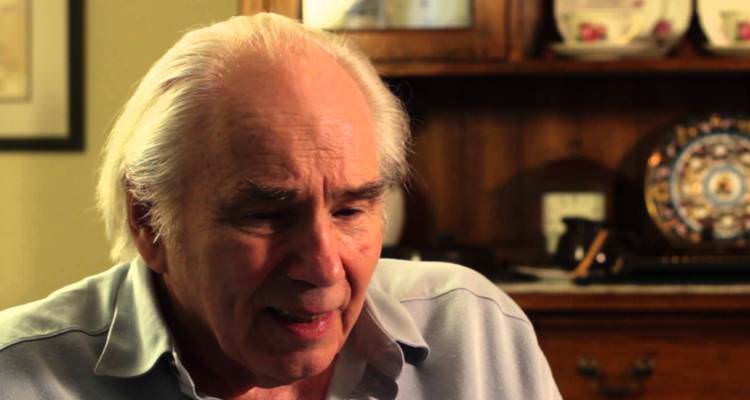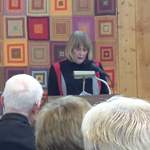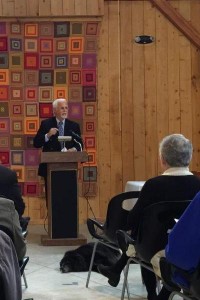A Tribute to Ernie Kurtz

Fifty Chosen Articles:
Number Fourteen.
Originally posted in May 2015.
Ernie was interested in, and supportive of, ALL paths to recovery.
By Roger C.
Ernie Kurtz died on January 19 of this year at the age of 79. A memorial service was held for him on April 22 at Dawn Farm, a rehab facility, in Ann Arbor, Michigan.
* * *
Ernie is most well known as the author of Not-God: A History of Alcoholics Anonymous which was his doctoral dissertation at Harvard University and published in 1979 by Hazelden.
Everything about this book is fascinating, including how he came to write it. Ernie was given full access to the AA archives which were just being put together at that time and he helped Nell Wing organize and catalogue its contents. Today that kind of unlimited access to the archives is virtually impossible.
The book is itself a treasure. It is broken into two parts: “The History” and “The Interpretation”. A favourite chapter is VIII, “The Context of Religious Ideas”, where Ernie wrote about the Oxford Group and its evangelical pietism with its “deep aversion to all emphasis on human strengths with a profound objection to any stress upon merely human sufficiency”. Sound like anything you have ever heard in the rooms or in, say, the 12 Steps?
Like “No human power”?
In Ernie’s obituary in The Fix, RIP Dr. Ernie Kurtz, Regina Walker writes:
As an historian and researcher, Kurtz explored the social conditions and influences of the 1930s, Depression-era America in which AA was founded, and sought to place the institution and movement within that historic context. In addition, he explored the psychological and religious underpinnings of the group and emphasized that regardless of the individual’s religious or spiritual belief system (or lack thereof), it was crucial for the alcoholic/addict to realize he/she was “Not God.”
Thus the name of the book.
That this history exists is essential. Otherwise there is no doubt that people would be making stuff up about AA’s history to suit their own interests and beliefs. We are grounded in the reality of AA’s early history and growth and that is thanks to one person and one person alone, Ernie Kurtz.
* * *
Ernie was a priest. He was ordained a priest in 1961 and only left the Catholic Church in the late 1970s.
He was also an alcoholic.
“Slipping into his own alcoholism, he was admitted to Guest House’s 3-month treatment program for priests in 1975 after continuing to drink following detoxification at the Harvard Infirmary”. (William White, “Ernest Kurtz: The Historian as Storyteller and Healer,” Alcoholism Treatment Quarterly) It was in fact while attending AA meetings that he became interested in the history of Alcoholics Anonymous. In the above-mentioned article by Bill White, he reported: “I was going to these AA meetings… I became very interested in the source of the ideas upon which AA was founded. I began to investigate AA History and the further I got into it, the more fascinated I became”.
After leaving the priesthood, Ernie began teaching at the University of Georgia where he met Linda, and they were married within a year. In 1990 they moved to Ann Arbor where they have lived for the past twenty-five years.
* * *
Ernie became friends with Katherine Ketcham and Bill White, with whom he would collaborate for the rest of his life.
With Katherine, he co-authored two books: The Spirituality of Imperfection (1992) and Experiencing Spirituality (2014).

Linda Kurtz at the Memorial Service
I reviewed The Spirituality of Imperfection in November, 2011, a few months after this website was first launched. In retrospect it wasn’t much of a review. Ernie immediately noted that I had used the review pretty much to tell my own story in early recovery. But to my surprise, he wasn’t offended; in fact, he thought it was appropriate and beneficial: the subtitle of the book is, after all, Storytelling and the Search for Meaning. As Bill White reports in his Personal Tribute to Ernie: “Ernie was a lover of stories and had a profound belief in the healing power of personal story reconstruction and storytelling”.
Ernie became Bill White’s friend and mentor when, in the early 1990s, Bill began writing Slaying the Dragon: The History of Addiction and Recovery in America. Looking for counsel, Bill was referred to Ernie. “I had no way of knowing that what I expected to be a brief consultation on the history of AA would evolve into a prolonged mentorship, multiple professional collaborations, and an enduring friendship.” Slaying the Dragon was originally published in 1998, and a second edition of the book was released in 2014. The book is essential for anyone interested in the history of addiction and recovery. With some 560 pages, it is well written and contains a huge wealth of information.
There were indeed “multiple professional collaborations” between Ernie and Bill. Three of these were published on AA Agnostica:
- A Message of Tolerance and Celebration (December 30, 2013)
- The Resilience of Alcoholics Anonymous (June 1, 2014)
- AA Agnostica and the Varieties of AA Experience (August 3, 2014)
In the last article, Ernie and Bill commemorate the third anniversary of this website. “As historians dedicated to documenting the growing varieties of addiction recovery experience, it is fitting that we take a moment to acknowledge this milestone within the history of Alcoholics Anonymous (AA).”
Looking at the history of efforts to accommodate atheists and agnostics in AA, the professional collaborators note, “AA Agnostica’s efforts to forge a secularized framework of recovery within AA thus has historic import”.
* * *
From the very beginning, Ernie was a friend of AA Agnostica.

Bill White, author of Slaying the Dragon, also at the Memorial Service.
In 2011, after my home group was booted out of the local GTA Intergroup, I began to write A History of Agnostic Groups in AA. Information and contacts that could help were hard to find, virtually impossible. Finally someone (Bill White, of course) referred me to Ernie Kurtz. I didn’t know who Ernie was at the time, to be quite frank.
But Ernie did everything he could to help. This didn’t come without occasional advice and cautions. He made it clear, for example, that he would not have any respect or tolerance for an article that was an attack on Alcoholics Anonymous.
I heard him.
When I published the article, Ernie was generous and effusive in his praise:
(A) magnificent work — clear, concise, respectful, insightful. I appreciate your work, and I am sure many others will. I also hope, with you, that this information will help atheists and agnostics in other, smaller places to be able to find comfort in AA… The fellowship owes you a debt of gratitude, though it may take time for them to realize that.
I have said this repeatedly but let me say it again: I never would have completed the essay without the support that Ernie provided. Having by then lapped up his Not-God book, I had a total respect for Ernie and he thus legitimized my efforts in a way that could not have been done by any other person.
And why would he do this, a former priest? As Bill White reports in his Personal Tribute to Ernie, “He was particularly interested in the growth of secular spirituality within AA, as represented by such groups as Atheists and Agnostics in AA (Quad A) and AA Agnostica”.
* * *
But let’s not get carried away, nor mislead.
Ernie was interested in, and supportive of, ALL paths to recovery.
This included both “secular and religious alternatives to AA” (Personal Tribute, Bill White) and those within the fellowship of AA who believe that God plays an essential role in their recovery and their day-to-day sobriety.
This fascination with a multitude of recovery methods goes back at least to 2005 when Bill and Ernie co-wrote an article which was reviewed on AA Agnostica in January, 2012, The Varieties of Recovery Experience.
And this fascination continued: Bill reports that Ernie said that if he were to write another book about AA, it would be called The Varieties of AA Experience.
For Ernie, it was all about recovery, no matter how one got there:
…that strength could rise from the acknowledgement of weakness, that wholeness could rise from brokenness, that authentic connection and community could rise from the most severe forms of estrangement and isolation, that envy and resentment could give way to forgiveness and gratitude, that grandiosity and self- hatred could both give way to self-acceptance and humility, and that injury to others could give way to service to others. These poignant lessons he found within his observations of men and women recovering from alcoholism…
He led the effort by Faces and Voices of Recovery to create a Guide to Recovery Mutual Aid Resources that catalogued secular, spiritual, and religious mutual aid groups in the United States. Ernie was one of the few people who commanded wide relationships and respect across these boundaries. When Ernie reflected on these diverse pathways of recovery, he saw more similarities than differences. (Personal Tribute, Bill White)
And this was well reflected at his memorial service at Dawn Farm on Stoney Creek Road in a rebuilt barn in Ypsilanti. The service opened and closed with prayers by Father Terry Dumas. Bill White “chaired” a host of people who came to the podium to pay their respects to Ernie.
One of them was one of Ernie’s sponsees, who wept openly at the podium.
Another was Joe C., the author of Beyond Belief: Agnostic Musings for 12 Step Life, the Foreword to the book having been written by Ernie.
Another was a man who described himself as the “Bishop of Books”. Ernie became “the shepherd of AA”, he said. He continued, “The shepherd means so many things. The shepherd is the one who looks after the one sheep who is lost. The shepherd cares for the whole flock”.
That captures my understanding of Ernie Kurtz. He believed that no one in recovery should be given up for lost. The helping hand should be there for everyone, everywhere, always, and that applies to every single person: the whole flock.
For a PDF of this article, click here: A Tribute to Ernie Kurtz.

























He was very accessible. I emailed him several times and he always had a very apt and informative reply.
Roger, I found a copy of “Not God” at the Wilson house when Catherine, my wife, and I were staying over night. I couldn’t put it down. I had never heard of Ernie or his book. Catherine would not let me steal the book so I ordered one online as soon as I got home. It should be required reading for anyone who is really interested in AA history. It was a slow read, for me, but worth every second.
The Spirituality of Imperfection is a really good read, too.
A really wonderful man.
Roger: thank you for reposting this wonderful tribute to Ernie. It takes me back in time to all those beautiful years with him and you capture his most fundamental philosophy on recovery so well.
Thank you, Roger, for reproducing your essay about Ernie Kurtz. As a reader of AA Agnostica, I was always so grateful to him both for the support he gave to this site and to our larger secular movement.
In your essay you mention Ernie’s popular writings like Not God: A History of Alcoholics Anonymous, The Spirituality of Imperfection, and Experiencing Spirituality as well as some of his excellent essays co-written with Bill White.
I would like to share with readers two of my favourite works by him.
The first is “Why A.A. Works: The Intellectual Significance of Alcoholics Anonymous” which traces the philosophical, and especially the existentialist, roots of AA.
The second is an essay entitled “Alcoholics Anonymous: A Phenomenon in American Religious History” which shows him deftly handling the topic of AA’s wide ranging — both orthodox and liberal — religious heritage.
Thank you for the flashback about Ernie Kurtz. A few years ago, we wanted to translate and publish his excellent book, Not God, in Poland. We exchanged a few friendly emails; he promised help. Unfortunately, during the negotiations, Ernie died, and the project collapsed.